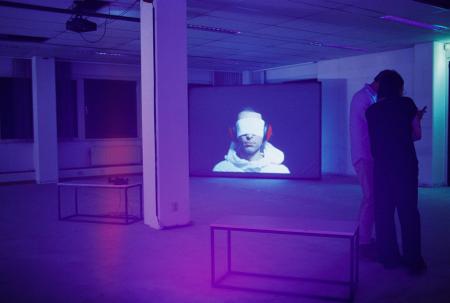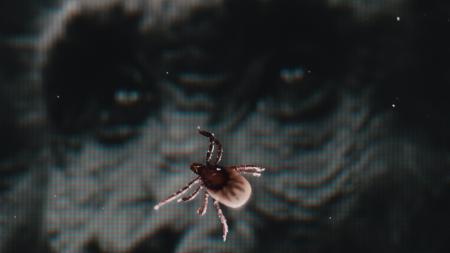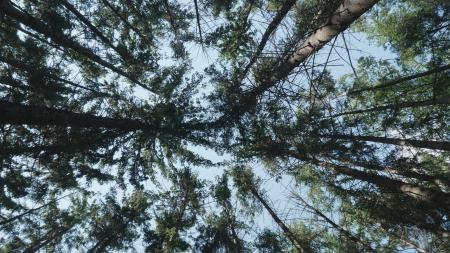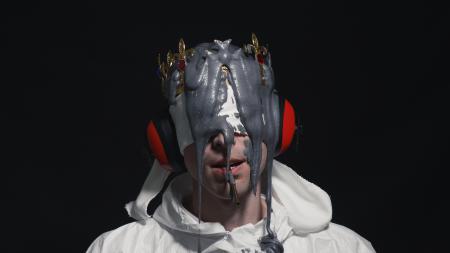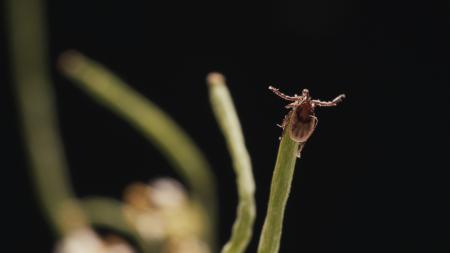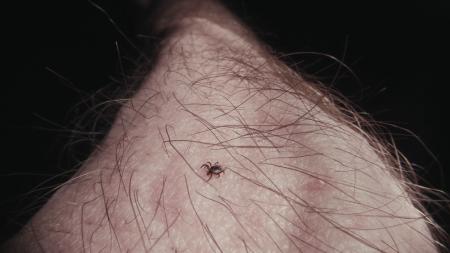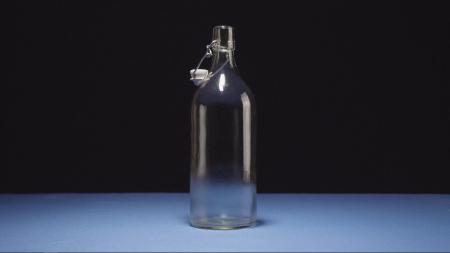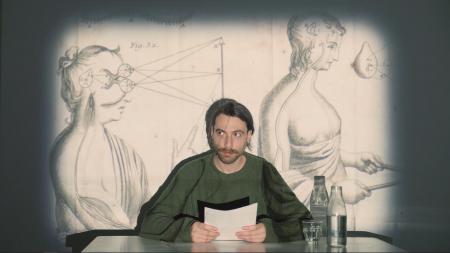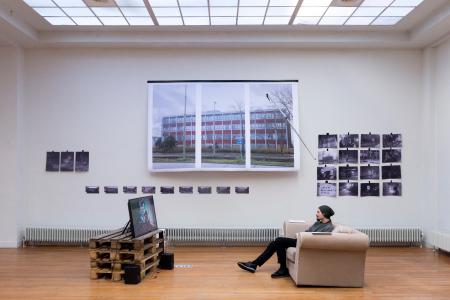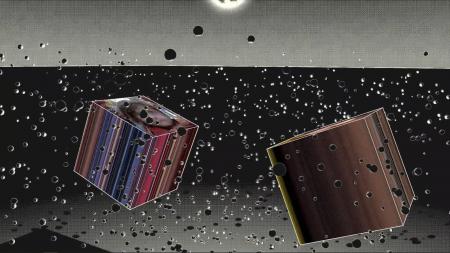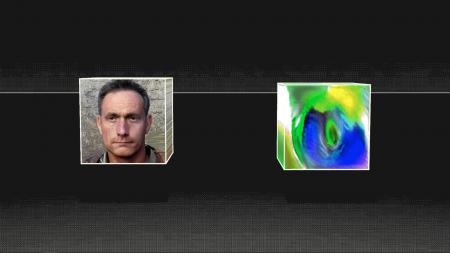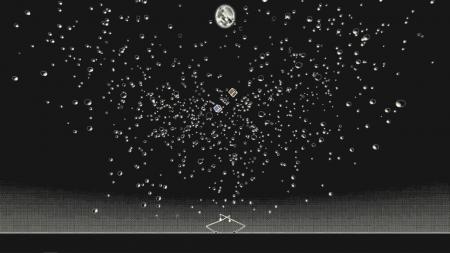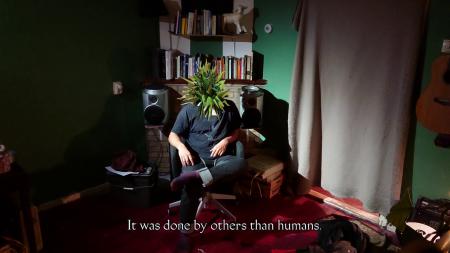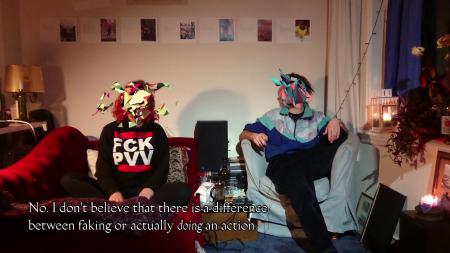-
info
'The blind point' shown at 'The New Current' exhibition, 2022
-
info
Looking closer at the world of the tick, the eyeless blood-sucking parasite, we are asked to adapt our perspective to a weird realm of nature, one that nevertheless shapes us. At this scale we stumble across an uncanny realisation: we are no less alien to the other than we are to ourselves. The tick’s world seems odd to us and hard to conceive, but the human being might be as well quite unfamiliar. A philosophical reflection through the lens of the microscopic perspectives, The Blind Point ponders on the limits of imagination and representation. Dario di Paolantonio’s visual essay questions the separation that is drawn between humans and non-humans, by taking the viewer through a walk in the forest, or following a tick crawling on skin.
-
info
Still from "The blind point"
-
info
"Tests for philosophy on media" is part of an ongoing artistic research regarding the possibility of doing philosophy through media and narration. Cinema is a valid tool to generate concepts, to let them unfold and talk as they were real characters. Moreover, any artistic practice can be seen as an act of world-building. "Latour litanies" reflects on the practice of making lists of disparate things, made famous by the French anthropologist and philosopher Bruno Latour.
-
info
Still from "The blind point"
-
info
"Tests for philosophy on media" is part of an ongoing artistic research regarding the possibility of philosophy through media and narration. Cinema is a valid tool to generate concepts, to let them unfold and talk as they were real characters. Moreover, any artistic practice can be seen as an act of world-building. "The quintessential object" draws from the meditation of German philosopher Martin Heidegger about a jug and its essence.
-
info
Still from "The blind point"
-
info
Still from "The blind point"
-
info
Still from "The blind point"
-
info
Still from "Tests for philosophy on media / The quintessential object"
-
info
Still from "Tests for philosophy on media / Latour litanies"
-
info
'Virtual squat' exhibited in 'I miss you, home', 2021
-
info
The work stages a speculative dialogue between two AI entities – a Discriminator and a Generator – engaged in a discussion about the meaning of reality. Generative adversarial network (GAN) is used both as a building material and as a narrative device for the video. The work addresses the consequences of the usage of new technologies in our society: the rapid achievements in the past decades had transformed the way we spread information and think about politics, shaping alongside even the structure of our reality and the concept of Truth. Whereas technology itself is not to blame, the urgent question is about the methodologies of our practices, and the perils of relying too much on the new “intelligent” tools.
-
info
Still from "It's not our duty"
-
info
Still from "It's not our duty"
-
info
Still from "It's not our duty"
-
info
What is Reality? It doesn’t seem the best question to put on the table if you’re looking for a house to live in. But peeking into the metaphysical field can even be a good strategy to find useful toolboxes for survival, and to discover how different worlds interact with each other: not being an ordered stack, but rather an intertwined mishmash. The infrastructures of law, bureaucracy and material city landscapes shape a jungle through which every one of us has to navigate. But we don’t need to stick to a singular layer in order to go on: indeed, every action – or reaction – relates to a patchwork of different planes working and conflicting with each other. A picture on Twitter is not entirely disconnected from European laws. An empty space surrounded by stark walls of bricks is related to communities’ desires and abstract contracts. Knowing that, a group of artists and activists tried to occupy a large building, but since they couldn’t find the way to enter physically in the space, they switched the direction of their efforts towards another, less obvious, domain of forces. Virtual squat is the true, perhaps even educational, story of this attempt.
-
info
Still from "Virtual squat"
-
info
Still from "Virtual squat"
Websites
Personal website
www.ddddpppp.comSocial media
Curriculum vitae
Education
-
2019 - 2021MA Non Linear Narrative Den Haag, Koninklijke Academie van Beeldende Kunsten diploma
-
2011 - 2015Philosophy University of Rome La Sapienza, IT diploma
exhibitions
-
2024More-than-human gaze Museum of Modern Art Warsaw, Poland Group
-
2023
-
2023Parentesi Cinema BASE Milan Group
-
2023Sand Nudes Film Festival somewhere in the dunes The Hague Winner of Sand Nude Film Award Group
-
2022From the Sea to the Clouds to the Soil // Museumnacht Den Haag Stroom The Hague, Netherlands Group
-
2022I miss you, home Nieuwe Kerk The Hague, Netherlands National Conference for student housing Group
-
2022Piep Knars Krijs Kraak Het Monument by Mokum Kraak Amsterdam Group
-
2022
-
2022
-
202119th Media Art Biennale WRO 2021 / REVERSO WRO Art Center Wrocław, Poland wro2021.wrocenter.pl/en/ Group
-
2021From where we know Koninklijke Academie van Beeldende Kunsten (KABK) The Hague, Netherlands from-where-we-know.net Group
-
2021
-
2021
-
2021STIFF - In Transmission Galerija SKC - Studentski kulturni centar Rijeka Rijeka, Netherlands studentfilmfestival.eu/stiff-2021/ Group
-
2021I miss you, home KABK, Gallery 1+2 The Hague, Netherlands Group
-
2020Punk Cinema Festival 2021 Amsterdam, Netherlands pcfamqwrce4z7xphdvamsgtfb22oqlliykhiwnsxwe6qaqkogw5j6myd.onion/pcfa2020/home/ Group
Projects
-
2021
The blind point The Hague, Netherlands Looking closer at the world of the tick, the eyeless blood-sucking parasite, we are asked to adapt our perspective to a weird realm of nature, one that nevertheless shapes us. At this scale we stumble across an uncanny realisation: we are no less alien to the other than we are to ourselves. The tick’s world seems odd to us and hard to conceive, but the human being might be as well quite unfamiliar. A philosophical reflection through the lens of the microscopic perspectives, The Blind Point ponders on the limits of imagination and representation. Dario di Paolantonio’s visual essay questions the separation that is drawn between humans and non-humans, by taking the viewer through a walk in the forest, or following a tick crawling on skin.
-
2021
Tests for philosophy on media The Hague, Netherlands The audiovisual medium is one of the best tools when there is the need to deal with complex topics, and to communicate in a strong but not impenetrable way. The forms of the documentary and the so-called ‘video-essay’ are great choices for this endeavour. Still, one of the risks is to simplify too much the topics in the effort to make them ‘digestible’ (or, in design-related terms, ‘efficient’). Fortunately, there are many good examples out there. The key aspect, of course, is narration. These projects are part of an ongoing artistic research regarding the possibility of doing philosophy through media and narration. Cinema is a valid tool to generate concepts, to let them unfold and talk as they were real characters. Moreover, any artistic practice can be seen as an act of world-building. Latour Litanies reflects on the practice of making lists of disparate things, made famous by the French anthropologist and philosopher Bruno Latour. The quintessential object draws from the meditation of German philosopher Martin Heidegger about a jug and its essence.
-
2020
It's not our duty The Hague, Netherlands The work stages a speculative dialogue between two AI entities – a Discriminator and a Generator – engaged in a discussion about the meaning of reality. Generative adversarial network (GAN) is used both as a building material and as a narrative device for the video. The work addresses the consequences of the usage of new technologies in our society: the rapid achievements in the past decades had transformed the way we spread information and think about politics, shaping alongside even the structure of our reality and the concept of Truth. Whereas technology itself is not to blame, the urgent question is about the methodologies of our practices, and the perils of relying too much on the new “intelligent” tools.
-
2019
Virtual squat The Hague, Netherlands What is Reality? It doesn’t seem the best question to put on the table if you’re looking for a house to live in. But peeking into the metaphysical field can even be a good strategy to find useful toolboxes for survival, and to discover how different worlds interact with each other: not being an ordered stack, but rather an intertwined mishmash. The infrastructures of law, bureaucracy and material city landscapes shape a jungle through which every one of us has to navigate. But we don’t need to stick to a singular layer in order to go on: indeed, every action – or reaction – relates to a patchwork of different planes working and conflicting with each other. A picture on Twitter is not entirely disconnected from European laws. An empty space surrounded by stark walls of bricks is related to communities’ desires and abstract contracts. Knowing that, a group of artists and activists tried to occupy a large building, but since they couldn’t find the way to enter physically in the space, they switched the direction of their efforts towards another, less obvious, domain of forces. Virtual squat is the true, perhaps even educational, story of this attempt.
Commissions
-
2022Mother as Grave Private client Den Haag Essay on existentialism and extractivism written for Ben Maier's photobook 'Father as Scale'.
-
2021After the hgh tide Royal College of Art London, United Kingdom After the high tide is a short story of the ‘speculative fiction’ genre, written for the 2021 Graduation Publication of the Master of Photography at the Royal College of Arts in London. Built by weaving together the photographs made by the students, it unfolds the story of an imaginary island through fragmentation of narrative, highlighting how different spaces are created in concert with the work of memory and collective imagination. The fictional work gave the title to the student's final degree show at Cromwell Place, London, and it is published by Folium. finished
Publications
-
2022Book Ben Maier The Hague, Netherlands
-
2021After the high tide Book Folium Dario di Paolantonio London, United Kingdom www.folium.site/shop/p/after-the-high-tide "Who’s in charge of making history? Who is responsible for the fragile and enduring threads that weave together a world? Where lies the root, the primary cause of the hues of reality? " So starts ‘After the High Tide’ a speculative fiction by philosopher Dario di Paolantonio written in response to the works of the MA Photography students at the Royal College of Art. With echoes of Italo Calvino, Liu Cixin, and H. G. Wells, Di Paolantonio’s text choreographs the book through narrative spaces inspired and punctuated by the photographers’ images. In the book text and image come together in an unexpected and unrestrained dialogue, producing a third space for the viewer's imagination to take off. 200mm x 130mm 112 pages Perfect Bound Soft cover with clear spot
-
2020Who Speaks? Catalog Royal Academy of Art The Hague L. Alexander & N. Schrader (Eds.) The Hague, Netherlands 2021 "Who Speaks?" was a semester-long educational programme which took place in 2020 in partnership with the Analysis and Research Department (DAO) of the Dutch Parliament that investigates artificial intelligence and its influences on democracy by means of language. The project collaboration was initiated by Non Linear Narrative Master’s programme of the Royal Academy of Art (KABK), The Hague, Goldsmiths (University of London) and Camberwell College of Arts (CCW / University of the Arts London).
Awards and grants
-
2023Winner of Sand Nude Film Festival Sand Nude Film Festival The Hague, Netherlands
-
2022Stroom PRO Invest Pro invest / Stroom, Den Haag The Hague, Netherlands
-
2022Experimental Grant Scheme Stimuleringsfonds Creatieve Industrie Rotterdam, Netherlands
-
2021Royal Academy Non Linear Narrative Department Award 2021 Royal Academy of Art, The Hague (KABK) The Hague, Netherlands Winner
-
2021Royal Academy Master thesis award Royal Academy of Art The Hague, NL The Hague, Netherlands Nominee
